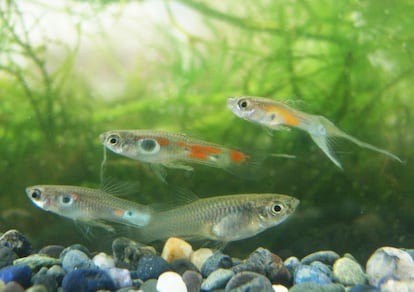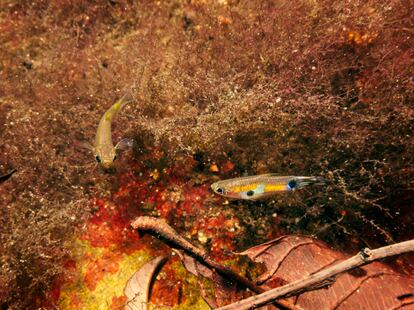Females copulate with ‘unusual kinds’ for the benefit of their offspring
A new study of fish published in ‘Science’ reveals some paradoxes about sexual selection, a process that also affects humans, though this has been somewhat diluted by culture

Nowadays, everyone accepts that for millions of years nature has cherry-picked those who are best suited to their environments. But it is more challenging to understand why, alongside this merit-based natural selection process, there is another that favors the most attractive, though they may not be much more than that. A century and a half ago, Charles Darwin, baffled by the peacock’s enormous tail, wrote about this selection of traits that facilitate copulation, even at the cost of their own survival. In Darwin’s hypothesis on sexual selection, males compete with each other for females, while females, who hold the key to reproduction, act in a finicky way by screening. The first part of the hypothesis was swiftly accepted, but for many years the second part was dismissed as preposterous.
This week, Science magazine published an article explaining how, at least in one species of fish, females fashion the groups they inhabit according to their tastes. Guppy fish (Poecilia reticulata) originate from tropical regions of Latin America and are extremely popular in aquariums all over the world. They are small (males less than 3 cm and females up to 5 cm) and reproduce rapidly, something that makes them an interesting species to observe closely. They also engage in internal fertilization - they copulate, and this allows the female to choose who she mates with. The authors of the study, under the leadership of Tomos Potter of Florida State University (USA), monitored more than 7,000 specimens in a stream on the Caribbean island of Trinidad, documenting their movements and analyzing their genomes across 10 generations. Their results show that the females prefer males with a different appearance, even though they derive no direct advantage from them.

The female preference for ‘unusual kinds’ could be interpreted as a way of preventing inbreeding, however, the analyses surprisingly found that the offspring of these breeders did not show lower levels of inbreeding. Yet these males had 36% more mates and 38% more offspring, while in the case of females, the reason appears to be for the benefit of their own offspring. Though these rare male types do not give them more offspring or even provide them with better genes, their offspring nevertheless benefit from being just as extraordinary as their fathers and they become prolific progenitors, bearing their mothers many grandchildren.
One of the intriguing results observed in the study is that females tend to favor males with unusual physical features, but also those who come from outside, though they may have a normal appearance and are not going to bear exotic offspring. The authors suggest that this perceived pitfall is the result of the females’ preference stemming from boredom with familiar-looking males, and that this is detected by scent. Although this preference yields them a benefit through the perceived success of their diverse offspring, it also leads them to mistakenly partner with males who seem unusual because they have not come across them before. However, these males will produce offspring that are as dull as other males in their environment. This serves as yet another reminder that evolutionary impulses can trigger patterns of behavior that are not necessarily beneficial to some individuals or even to their offspring.
“The origin of this preference may stem from a non-adaptive cognitive bias, which has short-term advantages, because the offspring benefit and will bear many grandchildren resembling their father. Yet this advantage will be lost in the grandchildren, who will no longer be so rare,” says Diego Gil, a specialist in evolutionary ecology at the Museum of Natural Sciences in Madrid. “If you look at this bias in a commercial perspective, if you sell something that everyone else is selling, you’re not going to be successful,” Gil adds. As a result, things that used to grab attention because they were fresh, become uninteresting when they are copied.
In many species, females have been observed to be attracted to exaggerated, eye-catching traits. This preference is partly explained because, for these features to develop, it is necessary for the male to possess a strong immune system, for instance. To some extent, this would be a sign of true capacity. “One of the most compelling aspects of this study is that in this highly polymorphic color pattern system of guppies, choosing the most unusual patterns brings about a unique advantage in terms of appeal,” explains Juan Gabriel Martinez, professor of zoology at the University of Granada. A further interesting point, according to Martinez, is that it helps explain how sexual selection by females can exist while maintaining male diversity. This is instead of all males acquiring the desired characteristics, meaning that there is no sense in the female’s selection because all males are of equal value.
Study leader Tomos Potter says that this fondness for odd features, which “has been observed in many species,” from “birds to beetles, fish to flies,” serves “to maintain genetic diversity as it saves rare genetic types from extinction.” For Potter, the big question was, “What is the advantage for females who find unusual features attractive?” “Our study demonstrates that attractiveness may be arbitrary, provided that the offspring of attractive males are also like this,” concludes the researcher.
The model for humans?
Animal studies have always been useful in understanding basic biological mechanisms that have emerged over millions of years of evolution and that have also existed in humans. Nevertheless, although numerous analogies have been drawn between the sexual behavior of animals and humans, such comparisons are always complex. “With humans we move onto a slippery slope and into arguments that could almost be regarded as racist”, says Gil. “On a pub conversation level, you could say that a dark-skinned man in Sweden attracts more attention than a typical Scandinavian does in Spain, but it would be difficult to gauge how that affects sexual preference. This could have an advantage in terms of being seen, in terms of surprising”, he speculates. Though he clarifies that features such as skin color in humans are mixed and not intact when passed on to the next generation, as is the case with the Mendelian traits of guppy fish.
Martínez points out that “the sexual selection process as such is the same or quite similar in all animals, also in humans”. “This involves a selection of characteristics that facilitates contact with individuals of the opposite sex. Some of these allow direct competition, such as with horns or fangs, but other traits are selected because they might simply appear more sexually attractive”, he continues. “Such pressure has existed in humans, but culture ensures that these mechanisms do not have the same influence as in other animals”, he concludes. This view is echoed by Potter, who does not believe it is possible to say “whether an effect of this kind is likely in humans, because [our] sexual preferences and their consequences are much more complex than those of guppy fish”.
Sign up for our weekly newsletter to get more English-language news coverage from EL PAÍS USA Edition
Tu suscripción se está usando en otro dispositivo
¿Quieres añadir otro usuario a tu suscripción?
Si continúas leyendo en este dispositivo, no se podrá leer en el otro.
FlechaTu suscripción se está usando en otro dispositivo y solo puedes acceder a EL PAÍS desde un dispositivo a la vez.
Si quieres compartir tu cuenta, cambia tu suscripción a la modalidad Premium, así podrás añadir otro usuario. Cada uno accederá con su propia cuenta de email, lo que os permitirá personalizar vuestra experiencia en EL PAÍS.
¿Tienes una suscripción de empresa? Accede aquí para contratar más cuentas.
En el caso de no saber quién está usando tu cuenta, te recomendamos cambiar tu contraseña aquí.
Si decides continuar compartiendo tu cuenta, este mensaje se mostrará en tu dispositivo y en el de la otra persona que está usando tu cuenta de forma indefinida, afectando a tu experiencia de lectura. Puedes consultar aquí los términos y condiciones de la suscripción digital.









































